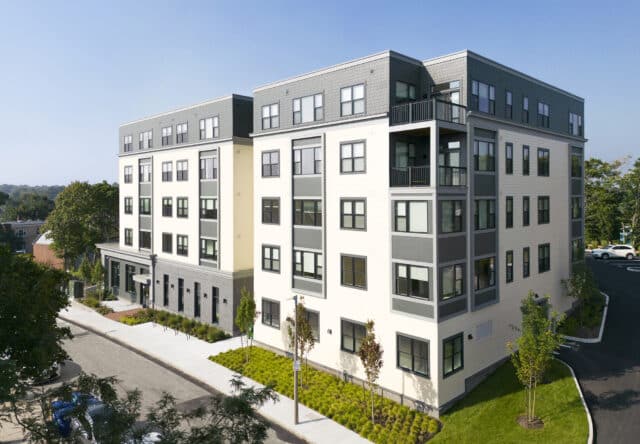Dariela Villón-Maga
Founder and President, DMV Housing Partners
Age: 37
Industry experience: 14 years
Dariela Villón-Maga has first-hand experience in the role that affordable housing can play in neighborhood stability, as a first-generation American who lived in a Dorchester property managed by nonprofit Lena Park Community Development Corp. Villon-Maga’s career path led to a job at another Boston-based nonprofit housing developer, Allston Brighton Community Development Corp., before founding her own housing consulting firm. Villon-Maga’s DMV Housing Partners now is creating new affordable home ownership opportunities in Boston, including a notable new development that illustrates the potential to build income-restricted condominiums as a generational wealth-building strategy.
The $21.9 million Saige on Fountain in Roxbury redeveloped a vacant lot that was cleared during urban renewal more than a half-century ago, creating 40 affordable condos reserved for households earning 55 percent and above the area median income. Developers received funding from the city of Boston and the state’s CommonWealth Builder fund, which subsidizes creation of income-restricted home ownership units.
Q: How did your partnership with Oxbow Urban emerge?
A: When I was at the Allston Brighton CDC, I took part in the Mel King Institute’s mentorship program, and I ended up being matched with [Oxbow Urban Partner] Kevin Maguire back in 2013. It was a year-long mentorship program but we kind of never let go, and he stayed my mentor. Kevin comes with a breadth of affordable housing experience, and Oxbow Urban has been focused on affordable housing for over a decade now.
Q: What was the selection process like for the 25 Fountain St. property, and what was the key to your team’s selection?
A: There wasn’t an RFP process, but the Fountain Hill Condominium Association was formed in 1989 and there was a portion of their project that wasn’t completed. They owned a ton of vacant land next to their condo association, and around 2016, they had to make some significant capital improvements to the exterior of their building. That prompted them to sell the undeveloped portion of their land. They partnered with a local Realtor and sought out developers who promised to do affordable housing. They also were an income-restricted home ownership community, and they wanted to continue that impact on what was left of their land. This was prior to the CommonWealth Builder program, so there really weren’t a lot of developers lining up, but the opportunity came across Oxbow Urban’s desk and they jumped on it, because it’s right in line with what Kevin likes to do and the impact they create in the neighborhoods.

Saige on Fountain was built on a vacant lot in Roxbury’s Fort Hill neighborhood using, in part, money from the state’s new CommonWealth Builder fund, which subsidizes creation of income-restricted home ownership units to help lower-income communities build generational wealth. Photo courtesy of Anton Grassi and Prellwitz Chilinski Assoc.
Q: How did the community review process influence the final designs for Fountain on Saige?
A: The community was super impactful in the evolution of the design from the start. The previous owners were strong advocates for home ownership. Oxbow had originally proposed 51 units in a midrise building, and a set of townhomes. The community pushed back on the townhomes, and firmly believed it should remain as an urban wild. So, we only proceeded with the midrise building. When it came to the design, we held focus groups with local community members on how to help shape the common areas and the layout of the building. They had significant impact in [requesting] the studio units, and we sold out all of the studio units to date and still have 1-bedrooms available.
Q: How can the BPDA’s Squares + Streets rezoning initiative benefit the types of projects that your company specializes in?
A: The initiative seems to be really focusing on the interconnectedness of housing, arts and culture, transit and small businesses, to engage and leverage the residents and business owners in Boston. If it’s done collaboratively and with a focus on community involvement, it can be a force for positive change. If it’s implemented with intentionality, it can be a force in combating the city’s housing crisis.
Villón-Maga’s Five Favorite Restaurants:
- Top Mix Bar & Kitchen
- MIDA Boston
- Hue Boston
- JP Roti Shop
- Barcelona Wine Bar




 |
| 

